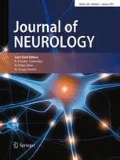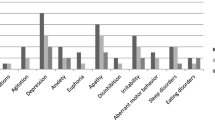Abstract
To investigate the relationship between disease severity, cognitive impairment and depression in progressive supranuclear palsy (PSP) we studied a group of 25 patients who fulfilled strict research criteria and 25 matched controls. Disease severity was judged from the duration of symptoms, level of physical disability using the Columbia Rating Scale (CRS), and the degree of eye movement abnormality. The neuropsychological battery was designed to assess attention and executive function, visual and auditory perception, semantic memory and language production. Although the PSP group were significantly impaired on almost all of these measures, the most profound deficits were on tests of sustained and divided attention. There was no correlation between cognitive impairment and either disease duration or scores on the CRS, but performance on tests of attention correlated significantly with the degree of ocular motor impairment. Depression was found to be common in PSP but did not correlate with any other parameters. It is concluded that the cognitive deficit in PSP is widespread and independent of depression. The association between the severity of eye movement disorder and deficits in sustained and divided attention leads us to postulate that pathology involving the midbrain periaqueductal region may be critical for breakdown in these fundamental processes.
Similar content being viewed by others
References
Albert ML, Feldman RG, Willis AL (1974) The ‘subcortical dementia’ of progressive supranuclear palsy. J Neurol Neurosurg Psychiatry 37: 121–130
Beck AT, Ward CH, Mendelson M, Mock J, Erbaugh J (1961) An inventory for measuring depression. Arch Gen Psychiatry 4: 561–585
Brown RG, Marsden CD, Quinn N, Wyke MA (1984) Alterations in cognitive performance and affect-arousal state during fluctuations in motor function in Parkinson's disease. J Neurol Neurosurg Psychiatry 47: 454–465
Cambier J, Masson M, Viader F, Limodin J, Strube A (1985) Le syndrome frontal de la paralysie supranucléaire progressive. Rev Neurol (Paris) 141:528–536
Cooper JA, Sagar HJ, Jordan N, Harvey NS, Sullivan EV (1991) Cognitive impairment in early, untreated Parkinson's disease and its relationship to motor disability. Brain 114: 2095–2122
Daniel SE, Bruin VMS de, Lees AJ (1995) The clinical and pathological spectrum of Steele-Richardson-Olszewski syndrome (progressive supranuclear palsy): a reappraisal. Brain 115: 759–770
Dubois B, Pillon B, Legault F, Agid Y, Lhermitte F (1988) Slowing of cognitive processing in progressive supranuclear palsy: a comparison with Parkinson's disease. Arch Neurol 45: 1194–1199
Esmonde T, Giles E, Xuereb J, Hodges JR (1996) Progressive supranuclear palsy presenting with dynamic aphasia. J Neurol Neurosurg Psychiatry 60: 403–410
Folstein MF, Folstein SE, McHugh PR (1975) “Mini-mental state”. A practical method for grading the mental state of patients for the clinician. J Psychiatr Res 12: 189–198
Grafman J, Litvan I, Gomez C, Chase TN (1990) Frontal lobe function in progressive supranuclear palsy. Arch Neurol 47: 553–558
Hodges JR, Patterson K (1995) Is semantic memory consistently impaired early in the course of Alzheimer's disease. Neuropsychologia 33: 441–459
Jackson JA, Jankovic J, Ford J (1983) Progressive supranuclear palsy: clinical features and response to treatment in 16 patients. Ann Neurol 13: 273–278
Janati A, Appel AR (1984) Psychiatric aspects of progressive supranuclear palsy. J Nerv Ment Dis 172: 85–89
Kay J, Lesser R, Coltheart M (1992) Psycholinguistic assessments of language processing in aphasia. Lawrence Erlbaum, Hove
Kimura D, Barnett HJM, Burkhart G (1981) The psychological test pattern in progressive supranuclear palsy. Neuropsychologica 19: 301–306
Lang AET, Fahn S (1989) Assessment of Parkinson's disease. In: Munsat TL (ed) Quantification of neurologic deficit. Butterworths, Stoneham, Mass, pp 49–67
Lantos PL (1994) The neuropathology of progressive supranuclear palsy. In: Tolosa E, Duvoisin R, Cruz-Sánchez FF (eds) Progressive supranuclear palsy: diagnosis, pathology, and therapy. Springer, New York Berlin Heidelberg, pp 137–152
Lees AJ (1987) The Steele-RichardsonOlszewski syndrome (progressive supranuclear palsy). In: Marsden CD, Fahn S (eds) Movement disorders 2. Butterworths, London, pp 272–287
Litvan I, Grafman J, Gomez C, Chase TN (1989) Memory impairment in patients with progressive supranuclear palsy. Arch Neurol 46: 765–767
Maher ER, Lees AJ (1986) The clinical features and natural history of the Steele-Richardson-Olszewski syndrome (progressive supranuclear palsy). Neurology 36: 1005–1008
Maher ER, Smith EM, Lees AJ (1985) Cognitive deficits in the SteeleRichardson-Olszewski syndrome (progressive supranuclear palsy). J Neurol Neurosurg Psychiatry 48: 1234–1239
Nelson HE (1982) The National Adult Reading Test. NFER-Nelson, Reading
Pillon B, Dubois B, Lhermitte F, Agid Y (1986) Heterogeneity of cognitive impairment in progressive supranuclear palsy, Parkinson's disease, and Alzheimer's disease. Neurology 36: 1179–1185
Pillon B, Dubois B, Ploska A, Agid Y (1991) Severity and specificity of cognitive impairment in Alzheimer's, Huntington's and Parkinson's diseases and progressive supranuclear palsy. Neurology 41: 634–643
Pillon B, Deweer B, Michon A, Malapani C, Agid Y, Dubois B (1994) Are explicit memory disorders of progressive supranuclear palsy related to damage to striatofrontal circuits? Comparison with Alzheimer's, Parkinson's, and Huntingdon's diseases. Neurology 44: 1264–1270
Rafal R (1992) Visually guided behaviour. In: Litvan I, Agid Y (eds) Progressive supranuclear palsy: clinical and research approaches. Oxford University Press, New York, pp 204–223
Robbins TW, James M, Owen AM, et al (1994) Cognitive deficits in progressive supranuclear palsy, Parkinson's disease, and multiple system atrophy in tests sensitive to frontal lobe dysfunction. J Neurol Neurosurg Psychiatry 57: 79–88
Robertson IH, Ward T, Ridgeway V, Nimmo-Smith I (1994) Test of Everyday Attention. Thames Valley Test Co, Bury St Edmonds
Van der Hurk P, Hodges JR (1995) Episodic and semantic memory in Alzheimer's disease (DAT) and progressive supranuclear palsy (PSP): a comparative study. J Clin Exp Neuropsychol 17: 459–471
Warrington EK, James M (1991) Visual object and space perception battery. Thames Valley Test Co, Bury St Edmonds
Wechsler DA (1987) Wechsler Memory Scale — Revised. Psychological Corporation, San Antonio, Tex
Author information
Authors and Affiliations
Corresponding author
Rights and permissions
About this article
Cite this article
Esmonde, T., Giles, E., Gibson, M. et al. Neuropsychological performance, disease severity, and depression in progressive supranuclear palsy. J Neurol 243, 638–643 (1996). https://doi.org/10.1007/BF00878659
Received:
Revised:
Accepted:
Issue Date:
DOI: https://doi.org/10.1007/BF00878659




